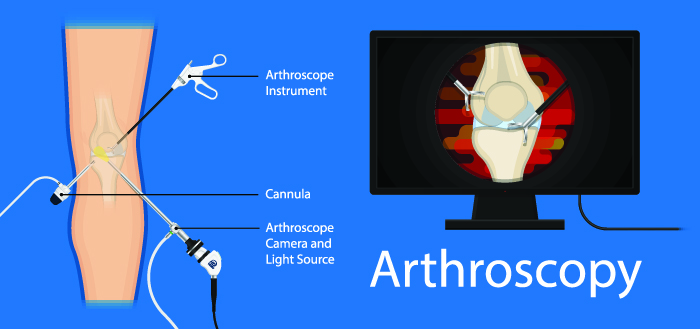Knee Arthroscopy Treatment & Diagnostics in Sadashiv Peth, Pune
Knee Arthroscopy
Arthroscopy of the knee is a surgical procedure performed for diagnosing and treating issues with the knee joint. Several knee issues like a misaligned patella or a torn meniscus can be diagnosed with knee arthroscopy. It can also help to heal joint ligaments.

The knee is the largest and one of the most complex joints in the body. It is made up of three bones – thighbone, shinbone, and kneecap. Other essential structures that make up the knee joint include –
- Ligaments – Ligaments are what connect one bone to the other bone. There are four essential ligaments in the knee that act like strong ropes to hold the knee together in place and keep it stable.
- Articular cartilage – Articular cartilage is a slippery, smooth substance that covers the ends of the tibia, femur, and back of the patella. It is responsible for helping the knee bones glide smoothly across each other when the leg is straightened or bent.
- Meniscus – There are two menisci in the knee between the femur and tibia. These act as shock absorbers and help cushion and stabilize the joint.
- Synovium – Synovium is a thin lining that surrounds the knee joint. It releases synovial fluid to lubricate the cartilage and reduce friction while moving.
Who needs a knee arthroscopy?
Knee arthroscopy may be recommended if you are experiencing knee pain so that the source of it can be confirmed and the problem can be treated. The knee problems and injuries that can be diagnosed with knee arthroscopy include:
- Baker’s cyst
- Torn anterior cruciate ligaments
- Torn posterior cruciate ligaments
- An out of position patella
- Torn meniscus
- Knee bone fracture
- Loose fragments of torn cartilage
- Swollen synovium (knee joint lining)
When to see a doctor?
If you are experiencing knee pain that is not improving with time, redness or, swelling in the knee, reduced knee motion, then you should see a doctor.
Request an appointment at Apollo Spectra, Pune
Call 1860-500-2244 to book an appointment
How to prepare for knee arthroscopy?
Before the surgery, your doctor will ask you about any medication that you are taking and whether you need to stop taking it. You will have to refrain from eating or drinking anything 6 to 12 hours before the surgery.
Knee arthroscopy surgery
Before the surgery is begun, the patient will be administered anesthesia. It can be:
- Local (numbs only the knee)
- Regional (numbs the area below the waist)
- General (completely asleep)
First, the surgeon makes a few small cuts in your knee. After that, for knee expansion, saline (sterile saltwater) will be pumped into it. This is done so that the surgeon can examine the joint. Then, an arthroscope is inserted through an incision. The surgeon will observe around the knee joint with the help of the camera attached to the arthroscope. The images captured by this camera will be visible on a monitor. Once the surgeon will have located the problem in the knee, they might proceed to correct the issue by inserting small tools through the other incisions. Once the surgery is complete, the surgeon will drain the saltwater from your joint and close the incisions with sutures.
Recovery after knee arthroscopy
Since knee arthroscopy is a minimally invasive surgery, it takes around one hour and most patients can go home that day itself, for recovery. Patients are advised to apply an ice pack on the knee and a dressing as well. Applying ice helps reduce swelling and relieve pain. You should also try to keep your leg elevated. Your doctor will advise you on how often the dressing needs to be changed. Typically, a follow-up appointment with your surgeon would be needed a few days after the procedure.
Apart from this, your doctor will also recommend an exercise routine that you can perform at home, to help the knee recover. Physical therapy can also help with recovery. These exercises would help restore your knee’s complete motion range as well as strengthening the muscles around the knee joint. Overall, recovery after knee arthroscopy can be quick and easy, given that proper care is taken.
Although it varies with each patient, knee arthroscopy can take anywhere between fifteen to forty-five minutes. After the surgery, the patient would be kept under observation for one to two hours and then you would mostly be discharged.
This depends on the procedure that you are having during arthroscopy. A meniscectomy may not require crutches as you are allowed to put weight on the leg the day you go home after surgery, whereas ACL reconstruction would require crutches for at least one week and a special knee brace for at least five to six weeks.
Generally, patients are allowed to participate in sports after proper rehabilitation and regaining strength and mobility in the knee, after the surgery.
Our Top Specialities
NOTICE BOARD
CONTACT US
CONTACT US
 Book Appointment
Book Appointment


.svg)
.svg)
.svg)
.svg)








